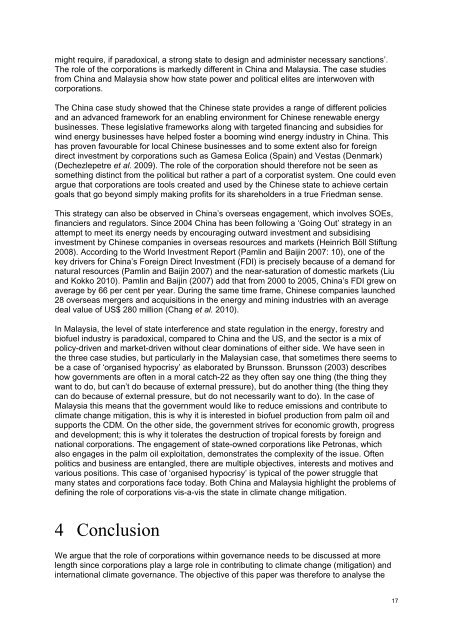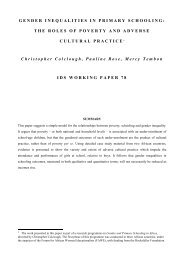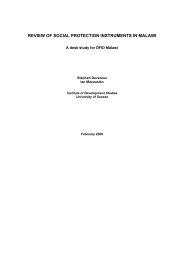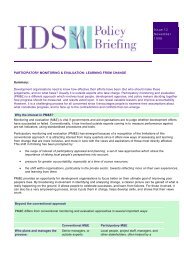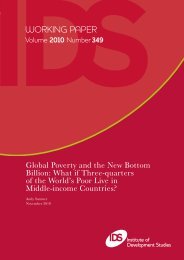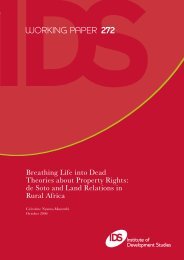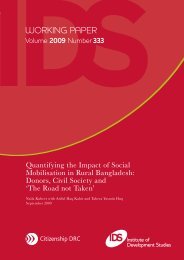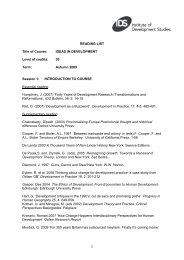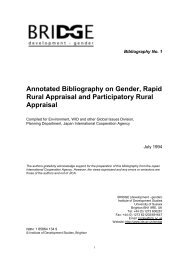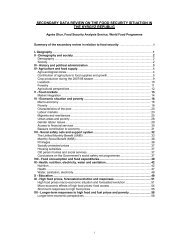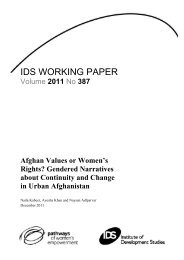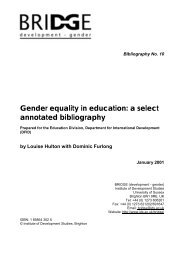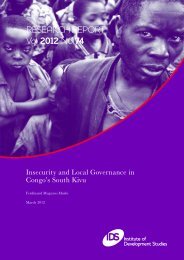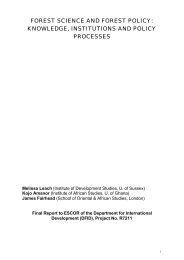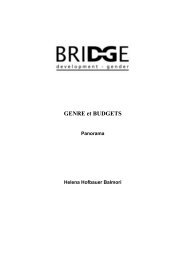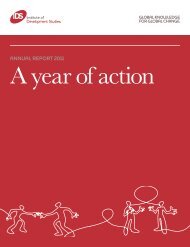IDS WORKING PAPER - Institute of Development Studies
IDS WORKING PAPER - Institute of Development Studies
IDS WORKING PAPER - Institute of Development Studies
You also want an ePaper? Increase the reach of your titles
YUMPU automatically turns print PDFs into web optimized ePapers that Google loves.
might require, if paradoxical, a strong state to design and administer necessary sanctions’.<br />
The role <strong>of</strong> the corporations is markedly different in China and Malaysia. The case studies<br />
from China and Malaysia show how state power and political elites are interwoven with<br />
corporations.<br />
The China case study showed that the Chinese state provides a range <strong>of</strong> different policies<br />
and an advanced framework for an enabling environment for Chinese renewable energy<br />
businesses. These legislative frameworks along with targeted financing and subsidies for<br />
wind energy businesses have helped foster a booming wind energy industry in China. This<br />
has proven favourable for local Chinese businesses and to some extent also for foreign<br />
direct investment by corporations such as Gamesa Eolica (Spain) and Vestas (Denmark)<br />
(Dechezlepetre et al. 2009). The role <strong>of</strong> the corporation should therefore not be seen as<br />
something distinct from the political but rather a part <strong>of</strong> a corporatist system. One could even<br />
argue that corporations are tools created and used by the Chinese state to achieve certain<br />
goals that go beyond simply making pr<strong>of</strong>its for its shareholders in a true Friedman sense.<br />
This strategy can also be observed in China’s overseas engagement, which involves SOEs,<br />
financiers and regulators. Since 2004 China has been following a ‘Going Out’ strategy in an<br />
attempt to meet its energy needs by encouraging outward investment and subsidising<br />
investment by Chinese companies in overseas resources and markets (Heinrich Böll Stiftung<br />
2008). According to the World Investment Report (Pamlin and Baijin 2007: 10), one <strong>of</strong> the<br />
key drivers for China’s Foreign Direct Investment (FDI) is precisely because <strong>of</strong> a demand for<br />
natural resources (Pamlin and Baijin 2007) and the near-saturation <strong>of</strong> domestic markets (Liu<br />
and Kokko 2010). Pamlin and Baijin (2007) add that from 2000 to 2005, China’s FDI grew on<br />
average by 66 per cent per year. During the same time frame, Chinese companies launched<br />
28 overseas mergers and acquisitions in the energy and mining industries with an average<br />
deal value <strong>of</strong> US$ 280 million (Chang et al. 2010).<br />
In Malaysia, the level <strong>of</strong> state interference and state regulation in the energy, forestry and<br />
bi<strong>of</strong>uel industry is paradoxical, compared to China and the US, and the sector is a mix <strong>of</strong><br />
policy-driven and market-driven without clear dominations <strong>of</strong> either side. We have seen in<br />
the three case studies, but particularly in the Malaysian case, that sometimes there seems to<br />
be a case <strong>of</strong> ‘organised hypocrisy’ as elaborated by Brunsson. Brunsson (2003) describes<br />
how governments are <strong>of</strong>ten in a moral catch-22 as they <strong>of</strong>ten say one thing (the thing they<br />
want to do, but can’t do because <strong>of</strong> external pressure), but do another thing (the thing they<br />
can do because <strong>of</strong> external pressure, but do not necessarily want to do). In the case <strong>of</strong><br />
Malaysia this means that the government would like to reduce emissions and contribute to<br />
climate change mitigation, this is why it is interested in bi<strong>of</strong>uel production from palm oil and<br />
supports the CDM. On the other side, the government strives for economic growth, progress<br />
and development; this is why it tolerates the destruction <strong>of</strong> tropical forests by foreign and<br />
national corporations. The engagement <strong>of</strong> state-owned corporations like Petronas, which<br />
also engages in the palm oil exploitation, demonstrates the complexity <strong>of</strong> the issue. Often<br />
politics and business are entangled, there are multiple objectives, interests and motives and<br />
various positions. This case <strong>of</strong> ‘organised hypocrisy’ is typical <strong>of</strong> the power struggle that<br />
many states and corporations face today. Both China and Malaysia highlight the problems <strong>of</strong><br />
defining the role <strong>of</strong> corporations vis-a-vis the state in climate change mitigation.<br />
4 Conclusion<br />
We argue that the role <strong>of</strong> corporations within governance needs to be discussed at more<br />
length since corporations play a large role in contributing to climate change (mitigation) and<br />
international climate governance. The objective <strong>of</strong> this paper was therefore to analyse the<br />
17


